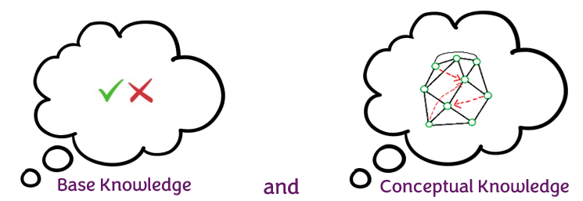An introduction to different types of knowledge
The pedagogy we use needs to align with the knowledge we are aiming to teach...

This statement seems to be obvious, but is it one that you have considered intentionally recently? Would it make a difference if you considered the type of knowledge you need the pupils to understand?
This post is an introduction to one of two distinct categories of knowledge – Base Knowledge. I will discuss Conceptual Knowledge in my next post. By reflecting on the distinctiveness of each, it is possible to consider how you arrange and organise learning in your classroom or school.
What is Base Knowledge?

The easiest way to identify if a piece of knowledge is Base Knowledge is to ask yourself the following question:
“Is this piece of knowledge either right or wrong?”
If the answer to this is yes – then it is a piece of Base Knowledge. The key characteristics of Base Knowledge are:
- Recall needs to be accurate
- Recall needs to be quick
- The piece of knowledge might be used to support the development of concepts
- The piece of knowledge might be used to carry out procedures
A little bit of science...
All knowledge develops when neural connections are formed. Every new piece of knowledge develops a new neural pathway. Going forward, each time we recall and use that piece of knowledge we make use of the neural pathway that was initially developed. (This paragraph contains three pieces of Base Knowledge, that work together to form a piece of Conceptual Knowledge.)
A neural pathway is a connection between neurons in the brain, and a piece of knowledge relies on an electrical signal ‘firing’ across the synapses (gaps) between neurons. When a neural pathway is used, the connection is strengthened by something called ‘myelin’. Each time the pathway is used, the connection is strengthened by the addition of more myelin. Myelin works like an insulator for the neurons, and increases the ease with which the electrical signal is transported.
Therefore, every rehearsal, every time we recall the piece of knowledge, we reinforce the neural pathway with more myelin. And so on…
How is Base Knowledge developed and learnt?

The single most important thing in developing Base Knowledge is ACCURACY at the earliest possible stage in the learning process.
Imagine the scenario in the graphic above. My first attempt was incorrect, but I didn’t know it was incorrect because I’m learning something new. I’ve created a neural pathway.
I know that practising my times tables is important to help me learn them, and I’m a really conscientious student, so I practice them lots. Unfortunately each time I practice 6 x7 I am reinforcing an incorrect memory, adding lots of lovely myelin to my neural pathway.
Then, one day my teacher gives me a quiz, and I get the question 6 x7 wrong, and my teacher shows me that the answer is in fact 42. So, all I have to do is practice 6 x 7 = 42.
Easy. Right?
...wrong...

The neural pathway for six multiplied by seven is well established for the incorrect answer 44. The electrical signals ‘fire’ much more quickly for this established route than they do for a new route.
At my next rehearsal, I need to recall 42 and not the answer 44. I know that this is what I want to practice. However, the neural pathway to the answer 44 is far more efficient than the newly formed pathway for the answer 42. In an attempt to be efficient and swift, my memory wants to give the answer 44.
Even when I have rehearsed this a few times, and forced the new neural pathway into action, my memory will still try to use ‘44’ as the response, which leads to confusion. In turn this is likely to lead to mistakes when I am under pressure to give an answer quickly. This confusion will continue until I have been able to rehearse giving the correct answer enough times. To do this, I need to rehearse the question and answer correctly until the new pathway is has gathered more myelin than the incorrect answer. Of course, this is much more difficult now, as each time I get confused and reach for the answer 44 I am strengthening that piece of knowledge.
The result is that I have to over-learn the correct knowledge exponentially more times than I did the incorrect knowledge that I initially developed.
The moral of the story...
If you recognise that the knowledge you want to develop is Base Knowledge rather than Conceptual Knowledge, please make sure that you allow for frequent rehearsal / practice. Check the accuracy as early as possible.
Want to know more?
If you would like to know more about Base Knowledge, Conceptual Knowledge and how to develop appropriate pedagogy, then please get in touch with me and we can discuss ways forward to meet your school’s needs. Contact details are in the CONTACT INFORMATION section.
Look out for...
Next time up - An introduction to conceptual knowledge.
Want to know when the next post is published? Then email stevenhorsley@stainsbymilleducation.co.uk and I will add your email address to my mailing list which I use to send out 'thought pieces' like this one and information about any upcoming events.

